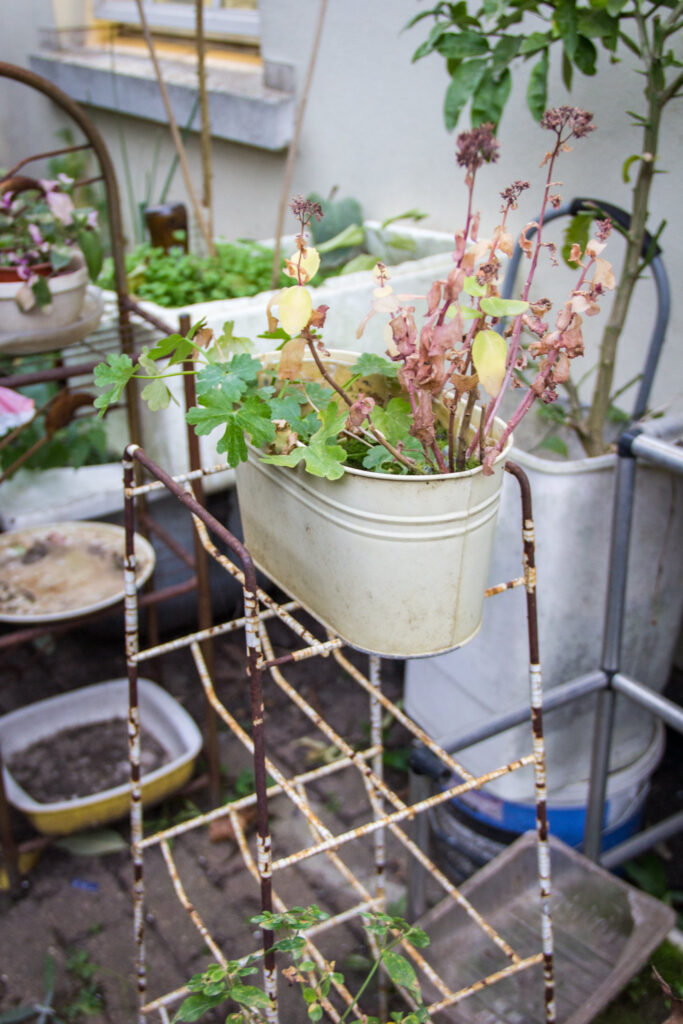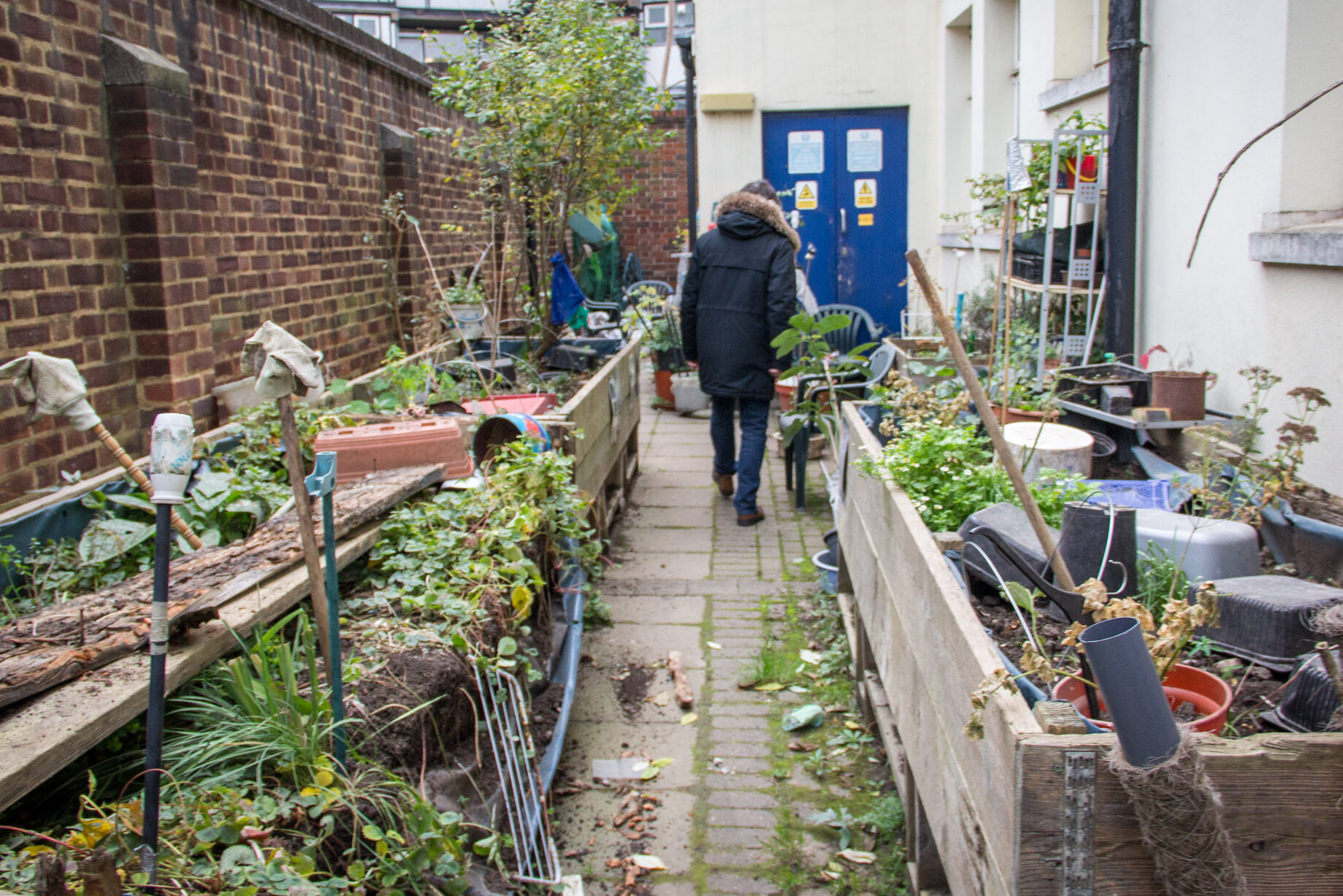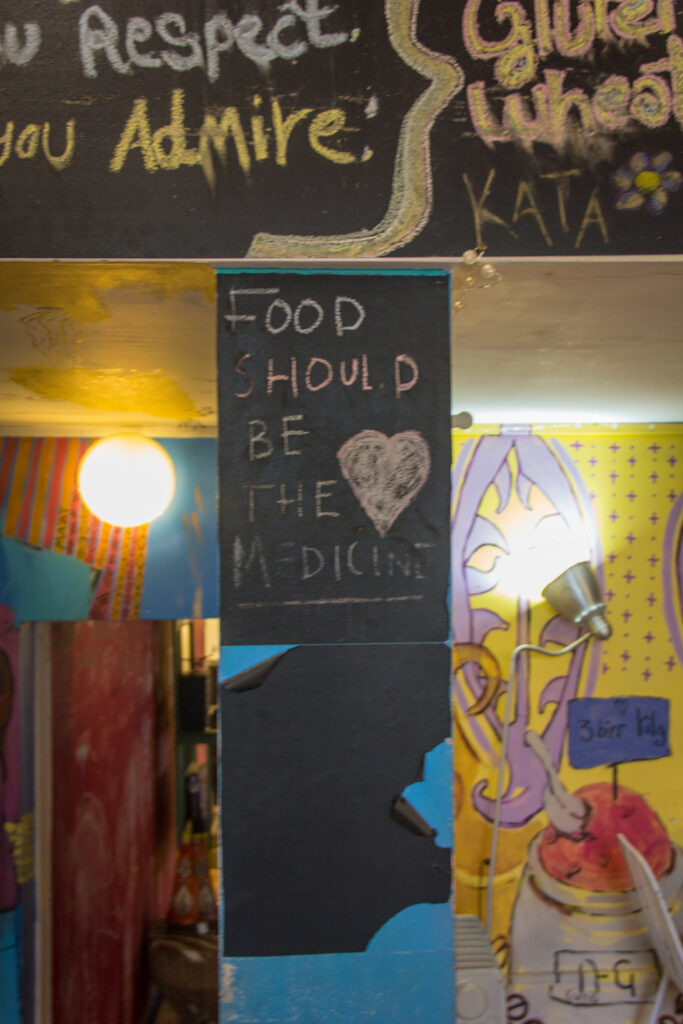It’s an overcast morning at the Jennie Lee Garden at King’s College Hospital, South London, but the cold, November air hasn’t deterred the site’s volunteers from attending their weekly gardening session. Madeleine* carefully scoops up the rust-coloured leaves that have drifted into the raised beds, while Catherine checks the still-tiny rocket shoots sheltered beneath upcycled bottle cloches.
The Jennie Lee Garden has been part of Lambeth GP Food Co-op since 2015, when founder and director Ed Rosen developed this once-neglected space into an accessible plot, where patients can be referred for sessions by the nearby Corner Surgery. Madeleine has been attending the sessions since the garden’s inception, while Catherine joined in June 2021, in response to her depression and anxiety. She says the impact on her mental health has been significant: “It has made a huge difference. It’s really hard to go out unless you have a purpose, unless you have something to do.”

The benefits work both ways. Catherine explains that despite her mental health issues she has “a lot of energy.” She wanted more from the sessions than just weeding and watering, so she asked Ed if she could create additional veg plots on undeveloped parts of site. “He said, ‘just start gardening it!’” she recalls. “It was important to have that autonomy from Ed – just having him say ‘go and do something.’ It’s a chance to be creative and do something important.”
Catherine has enjoyed sharing her existing gardening skills with other volunteers, and in turn has learned from them. She explains she is particularly good at growing different varieties of strawberry, which will fruit throughout the season, while Madeleine has demonstrated how to make leaf mould to improve the soil. This homemade mulch also means the garden is more self-sustaining, where waste is reused, and less is brought in from outside.
This autonomy and creativity is at the heart of the Lambeth GP Food Co-op, which Ed set up in 2013 alongside GP Dr Raj Mitra and NHS midwife Hilda Castillo Binger. The co-operative element is incredibly important: it doesn’t just refer to the medical staff; all of the volunteers and patients have a say in how the sites are run. The users collectively determine what to grow and where, and decide when to pause the volunteer sessions over winter, for example.
The co-op’s first food growing space was set up at Raj’s practice, the Lambeth Walk Surgery in Kennington. Despite being hemmed in by busy roads and tower blocks, Ed, Hilda and Raj realised an alleyway at the back of the surgery could be used to cultivate fruit and veg, and – importantly – create an accessible green space for some of the practice’s 8,000 patients, many of whom have no garden of their own. In 2012 the co-op was successful in winning three-year financial support from Lambeth Council’s Co-operative Investment Fund, along with funding from NHS Lambeth’s Clinical Commissioning Group.


With funding from the Guy’s and St Thomas’s NHS Foundation Trust, they installed raised beds that were accessible for those in wheelchairs or with mobility issues, and set about ‘recruiting’ volunteer gardeners during weekly diabetes clinics and via text messages to patients. They sat in the waiting room in the mornings to chat to people about the project, and left flyers on the tables. And so, the weekly gardening group began.
Ed stresses that the Lambeth GP Food Co-op is “not a mental health service” – it is far more holistic than that. The project benefits people with long-term health conditions ranging from arthritis, diabetes, asthma and heart conditions, through to mild to medium depression, anxiety and OCD. At least 15,000 Lambeth residents live with these conditions, and Ed and Raj recognise that in many cases the challenges facing people are not medical, but social. Patients can be referred here by their GPs, or join as a volunteer, to socialise, engage in gentle exercise, spend time outdoors and learn about food growing.
On an anecdotal level at least, the results are impressive, says Raj. “The patients who come to the group – we never see them in the surgery.”
While the capacity of the alleyway garden at the Lambeth Walk Surgery is limited by its size, the co-op has access to larger spaces. Up to 40 patients at a time can be accommodated at the Grantham Surgery garden in Stockwell, where Hilda is the lead gardener; while patients at the Brixton Hill Surgery can be referred to a substantial green space tucked away at the back of Katakata restaurant, located directly across the road.


Franklin, the restaurant’s affable owner, was looking to develop the garden in a way that benefitted the community. He offered the space to the Lambeth GP Food Co-op and the vegetable beds were installed with funding from the trust. Regular volunteer gardening sessions typically involve patients from the Brixton Hill Surgery and those referred via the Health Inclusion Team at the Pavilion Medical Centre, also in Brixton.
Ed acknowledges the importance of linking the co-op with this particular restaurant. Katakata’s dishes are all vegan or vegetarian, served alongside healthy juices, and can inspire local residents to eat in a way which benefits themselves and the planet. Vibrant murals inside and outside the restaurant promote the benefits of fruit and vegetables. Ed also explains how getting creative in these spaces can inspire more people to get involved and to get interested in food growing – by planting edible flowers, for example, or creating willow structures and living walls.
“We can turn it into a craft,” he says. “Show people how to make veg growing beautiful.”

Ed says that one of the co-op’s successes is that it has been proven to work in very different contexts. While the majority of its sites are open to patients and volunteers, the garden at central Brixton’s Pulross Centre has a very different remit. This 20-bed neurorehabilitation unit treats patients with brain injuries and strokes who have been discharged from hospital, and who may spend several months here before returning home.


Each ward overlooks the secluded garden, still deep green in mid-November, and multiple ramps and walkways lead out onto the space, ensuring it is accessible for people using wheelchairs or mobility aids. Occupational therapists take patients into the garden on warmer days, to water the plants for example or simply enjoy the space. Carpenters from Guy’s Hospital custom-built the striking raised beds, and the benches are often used by staff members on their lunchbreaks or for outdoor meetings. Ed hopes that the summer house will be used as a learning space for patients, with workshops on growing vegetables or talks about soil and composting.
The garden is an incredibly restorative space for the patients while they are here, but it can continue to have physical and mental health benefits for them long after they have left. One former patient is Tom, who spoke movingly at the 2021 NHS Forest conference. He came to Pulross following a stroke in 2019 and was involved in the garden as part of his rehabilitation. Today, he is a regular and enthusiastic gardener at the Jennie Lee garden, where he volunteers weekly alongside Catherine and Madeleine.
Tom is filled with gratitude for the project that has contributed greatly to his physical recovery from the stroke, as well as his mental wellbeing. He explains that he takes fewer painkillers on the days when he gardens, and has experienced the restorative effects of food growing as both an inpatient and an outpatient.
“There are many, many therapeutic benefits to being involved in the gardens… They include connecting with the ground, and with the soil, and with nature, and knowing the seasons, and they keep you grounded, especially during difficult times when your mind is troubled. And socialisation – the opportunity to meet like-minded people who also share the same troubles and same thoughts and drive. There’s a way to go in my rehabilitation, but I can tell you this: my experience now is that I’m in a much better place.”
Tom received vital support through the co-op’s buddy system, which was set up during the Covid-19 lockdown to ensure patients did not feel abandoned when the in-person gardening sessions stopped. Tom was isolated and unable to work. As his mental health plummeted, the Lambeth GP Food Co-op sent him seeds and gardening tools to ensure he could continue to grow produce at home, and his ‘buddy’ – a nurse with gardening experience – called him regularly to see how he was getting on. It made, he says, “a huge difference. It was a really tough time for me, but my friends in the group, they helped me to come through.”
Over the course of the pandemic, the co-op sent out 9,000 packets of seeds, provided by Suttons Seeds and distributed via Lambeth Council’s Emergency Food Distribution Network. It was a good exercise to understand how the project could be scaled up, and to ensure that those who most needed it could still be supported at an exceptionally challenging time.
* Some names have been changed
Related articles
Read more about the Lambeth GP Co-op on the project website, and hear Tom’s full account of his experiences with the co-op in his presentation at the 2021 NHS Forest Conference.
